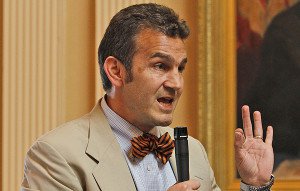Eyes off: Some lawmakers want to restrict license plate readers

MOVING FORWARD: Democratic Sen. Chap Petersen is one of the lawmakers pushing for reforms and restrictions in how police collect and retain license plate data.
By Kathryn Watson | Watchdog.org, Virginia Bureau
ALEXANDRIA, Va. — Some Virginia lawmakers plan to file legislation restricting police use of controversial automatic license plate reader technology, though others have yet to take a public stance.
Police use of ALPR technology has hit home with many Virginians — and many Americans.
We got dozens of emails after Watchdog.org broke a story showing how Alexandria police captured my license plate many times on camera over six months.
Virginia law places no restrictions on how police collect or maintain license plate information gathered by the technology, which can snap up to 1,800 plates per minute. The plates can be checked for any violations and sent to a central database for storage.
Last year, then-Attorney General Ken Cuccinelli issued an opinion saying the Virginia State Police can’t capture license plate data outside of a specific, ongoing criminal investigation, and that they can’t store data indefinitely.
Cuccinelli’s word, however, isn’t law, and local police departments have been left to their own devices.
Democratic Sen. Chap Petersen of Fairfax and Republican Delegate Richard Anderson of Woodbridge, founders of the new Ben Franklin Liberty Caucus, plan to file legislation in the 2015 legislative session restricting the collection and retention of ALPR-generated data.
Other leading lawmakers have yet to step up.
“The speaker understands this is an important and complex issue,” said Matthew Moran, spokesman for Bill Howell, Republican speaker of the House. “He looks forward to studying the issue more in the future and finding the best course for the commonwealth.”
Democratic House Minority Leader David Toscano didn’t respond to our request for comment, nor did Democratic Senate Majority Leader Dick Saslaw or Republican Senate Minority Leader Tommy Norment.
Petersen and Anderson say their plan will restrict both when and in what instances law enforcement agencies are allowed to use ALPR technology, and how long that information can be kept on file.
“The short answer is yes, I do intend to file legislation in 2015,” Petersen told Watchdog.org. “And I think we needed a year to sort of collect data and see what the best practices are. But notwithstanding that, my intention is, if we don’t ban LPRs, at least restrict them pretty severely in the sense that we should limit them to either being used as part of an active manhunt, or where there’s an actual target, or a warrant or something like that.”
Petersen said he doesn’t want to lock himself into a time period for how long police can store that data — maybe 72 hours, maybe seven days, maybe longer.
“My purpose again is to really limit it, so LPRs can be used as an investigative tool but can’t just go and collect data randomly,” Petersen said,
Scrutinizing ordinary citizens without reasonable suspicion of a crime isn’t the American way, he said.
As soon as the all-consuming battle over Medicaid and the budget ends, Anderson said he, Petersen and others are ready to dig into crafting legislation, starting with lots of input from police and residents in the form of public meetings.
“This is public business,” Anderson said. “I want to hear from people, whether they like or hate or are somewhere in between on this policy that these jurisdictions are following right now.”
Of course, there is no single, set policy across all local police departments in Virginia. That, Anderson said, needs to change.
“I want it to be the same in Norfolk as it is in Narrows,” Anderson said. “In Norfolk and Narrows, I want a consistent, easily understood policy — easily understood by law enforcement and easily understood by the general public, which means non-attorneys like me ought to write the law.”
With representatives of both parties working together on legislation, Anderson said he thinks a bill restricting the use of ALPR technology has a “good chance of surviving the legislative process.”
But there’s another powerful person who can’t be left out of the conversation — Democratic Gov. Terry McAuliffe, who just vetoed a popular bill that would have allowed drivers who get red-light-camera tickets to fight those tickets higher up in the court system.
“I will probably want to work with the governor’s office, too,” Anderson said. “I’m trying to keep my finger on the pulse beat of how they view this because, in the end, it’s going to be the governor who is going to fix his signature to whatever we send him.”
Kathryn Watson is an investigative reporter with Watchdog.org’s Virginia bureau, and can be reached at kwatson@watchdog.org. Or, follow her on Twitter @kathrynw5.







